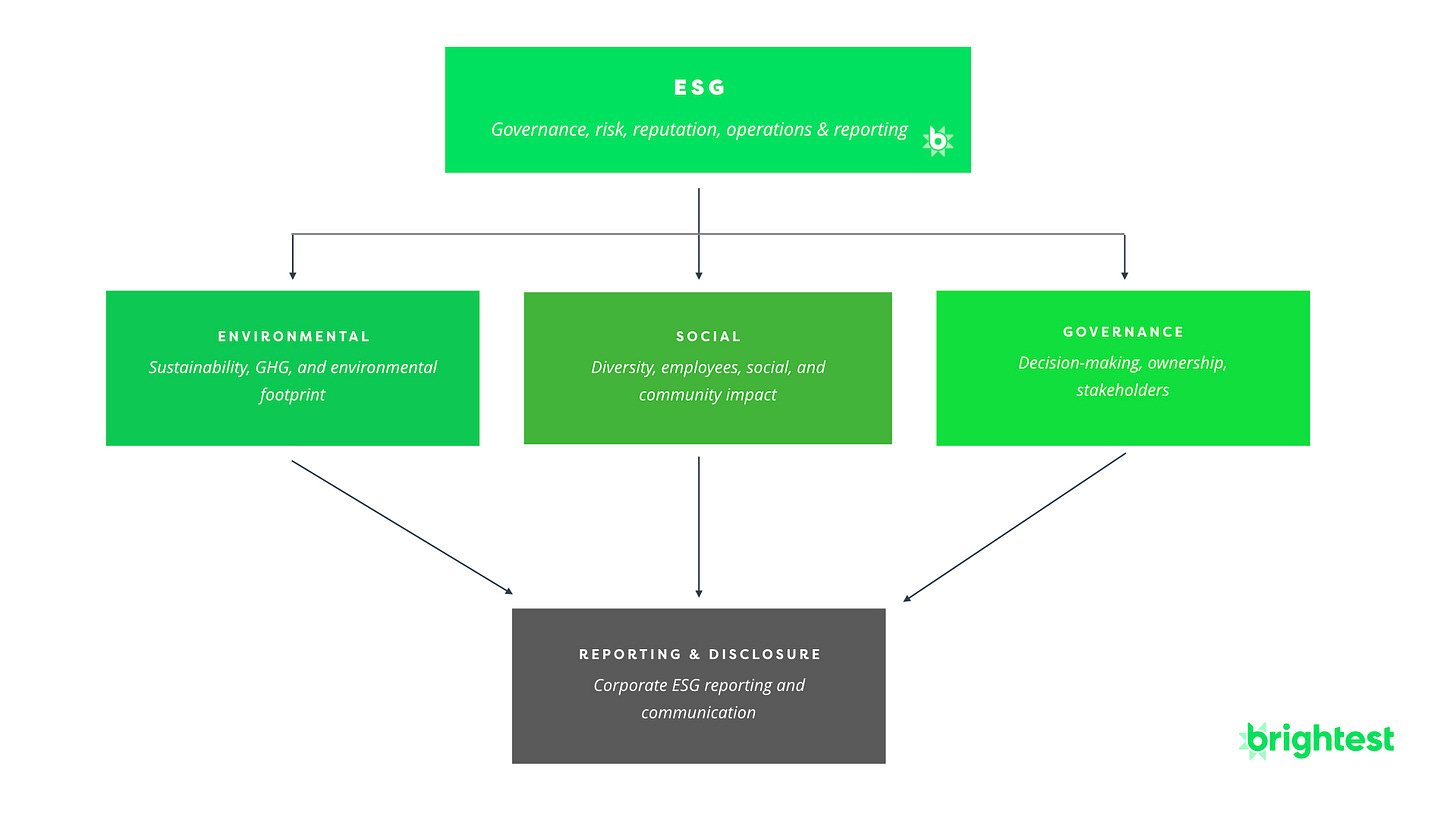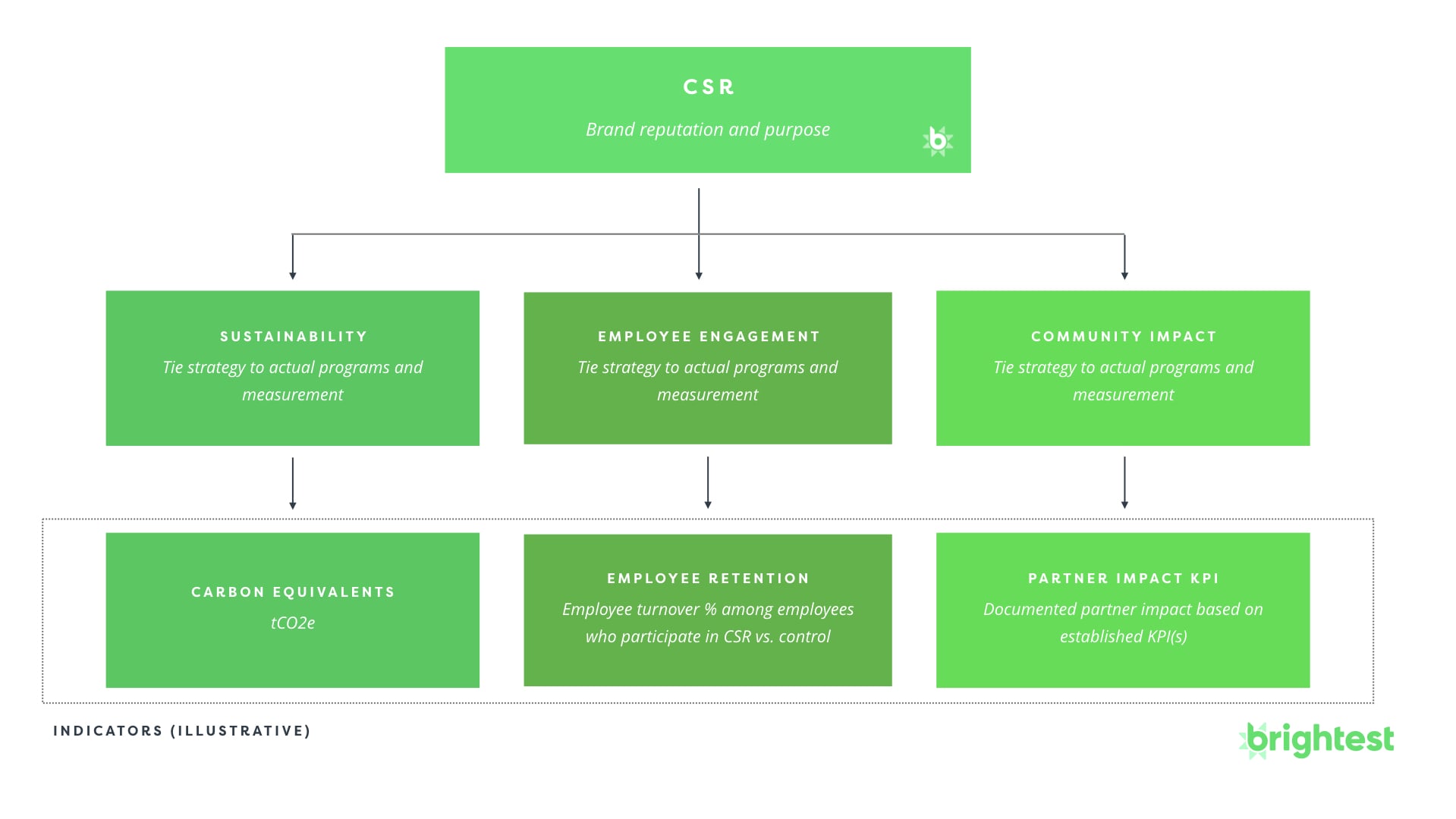The Difference Between ESG and CSR
In business conversations, we often hear environmental social governance (ESG) and corporate social responsibility (CSR) used interchangeably. Since CSR and ESG both share the same “S” (“social”), it’s common to think they overlap or do the same thing. In some companies this is true, where a CSR department may take on ESG responsibilities. But there are important differences between ESG and CSR that have implications for corporate strategy, org design, communication, prioritization, and reporting.
Let’s quickly break those differences down.
What is ESG?
ESG, at its core, is a corporate governance, reporting, and investment framework. What this means in practice is companies that adopt ESG principles consider, measure, report (and, hopefully, work to improve) the environmental, social, and governance aspects of their business alongside its financial considerations (profit, expenses, growth, accounting). Likewise, ESG investors consider a company’s environmental, social and governance attributes alongside their financial attributes when deciding whether or not (and how) to invest in them.

When you think ESG, think capital, operations, risk, reputation, and reporting (or “CORRR” if you like acronyms), which includes several things that go beyond CSR. This includes:
Environmental
Environmental compliance activities, attributes, and disclosures, including greenhouse gas emissions, carbon accounting, waste management, and other environmental impacts. This ESG category essentially encompasses our definition of corporate sustainability — balancing the environment, equity, and economy across products, packaging, facilities, energy usage, people, and waste in a way that doesn’t contribute to global warming, climate change, and biodiversity loss — through an investment and corporate decision-making lens.
Occassionally we see CSR teams take on environmental or sustainability responsibilities within a company, but it's uncommon.
Social
Social ESG activities focus on data and disclosure. ESG teams work with HR, IT, supply chain, and other teams to collect information about a company's workplace health and safety, employee diversity and inclusion, social and community impacts, and other ESG performance indicators.
By comparison, CSR teams run social programs, campaigns, and initiatives, and this is one of the areas where CSR and ESG commonly meet. Over the course of a year, a CSR team will develop non-profit and community partnerships, make charitable donations and grants, and lead employee engagement and giving initiatives. CSR should also collect impact data on its programs and grants. ESG teams then collect CSR, environmental, and other data, and include it within the company's ESG reporting and disclosure.
Bottom line? Typically, CSR departments lead a company's social and community work. ESG teams collect data, communicate it to stakeholders, and help keep the business compliant with environmental and social laws, standards, and regulations.
Governance
Governance ESG activities, attributes, and disclosures include considerations like company ownership structure, decision-making, corporate policies, leadership diversity, risk management, and other aspects that balance the rights, responsibilities, and identity of various shareholders and stakeholders in the company. Typically, these are all aspects of the business CSR doesn't participate in.

Comparing CSR to ESG
CSR teams pursue a company's social mission or purpose. This includes designing, planning, and carrying out programs and initiatives that improve a company's reputation, culture, and social impact. Examples are:
- Charitable giving and corporate philanthropy
- Employee giving
- Employee engagement and volunteering
- Community partnerships
- Sustainability (sometimes)
Because many of CSR's initiatives are employee-centric activities like giving and volunteering), it's common for CSR departments to work closely with HR. ESG might measure, manage data, and report on these activities, but usually it isn't the team responsible for their execution.

Another Way to Compare CSR vs. ESG: Two Types of Corporate "Good"
A second way is to view the difference between CSR and ESG is to think about corporate social responsibility as the "charitable" side of corporate good, compared to environmental social governance acting as the "financial", "risk management" or "regulatory" lens. In modern history, public companies operate, perform financial accounting, and then issue shareholder reports like a 10-K which investors can use to decide if they want to invest in the company or not. The problem with this narrow approach however — as we've seen recently with companies like Exxon Mobil — is financial accounting doesn’t fully account for the consequences and risks of operating a company, particularly long-term issues like climate risk.
If a company makes a profit cutting down trees and destroying local forest and wildlife, it could have good financial accounting performance on paper. But anyone who uses an ESG framework or lens to view the company quickly realizes (a) the company’s not counting the real costs of its business and (b) there are huge risks to its business viability, such as the government noticing what it's doing and shutting it down or forcing it to pay fines.

No ESG investor would invest in this company. And that in and of itself is increasingly becoming a risk to companies: as trillions of investment dollars transition to ESG, many environmentally or socially harmful companies are seeing it become more and more difficult to find investors who will fund their business.
On the other hand, a CSR department at a company would be more likely to build partnerships with local environmental and wildlife organizations. It might make donations to help plant trees, clean up local parks, and improve biodiversity. Whereas ESG focuses on the risks and investment considerations of a company's social impact, thoughtful CSR works to increase that impact.
Summarizing the Difference Between ESG and CSR
Now that we’ve defined ESG and CSR, let’s summarize the key differences between them:
1. ESG is about company decision-making around social risks and opportunities — whereas CSR is about the relationship between a company, society, and the communities it impacts
2. ESG is an investment framework that helps external investors assess company social performance and risk, whereas CSR helps build brand value, strengthen company culture, and improve the firm's reputation through social initiatives
3. CSR focuses on programs and partnerships (often with non-profits), ESG focuses on stakeholder reporting
4. ESG is based on standards set by lawmakers, investors, and ESG reporting organizations (e.g., GRI, TCFD, MSCI), whereas CSR is usually more company-specific in terms of its focus areas, priorities, metrics, and measurement
5. ESG is typically more relevant for larger companies who are listed on public investment exchanges or who need financing from institutional investors. CSR, by contrast, has historically focused on charitable investments by the company, and can be practices by a company of any size
This overall risk and materiality profile of ESG is a final key place where it differs (and goes beyond) CSR. For example, a company can establish lots of non-profit partnerships and make donations through its CSR department, but what is the overall ESG performance and profile of the company as a whole? What's its emission footprint? How is it performing in terms of workplace health and safety? Is it a diverse company? What about the board and executive leadership? CSR can't address many of these issues at the department, whereas ESG offers a company-wide lens on decisions, actions, and performance.





